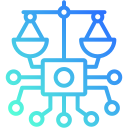Ethical Implications of AI in Society
The rapid advancement of artificial intelligence has brought about significant benefits to society, from streamlining workflows to transforming healthcare and education. However, the integration of AI into daily life also introduces a host of ethical dilemmas that need careful consideration. Navigating these complexities is essential to ensure that AI technologies benefit humanity as a whole while minimizing potential risks. Understanding the ethical implications empowers policymakers, technologists, and the public to make informed decisions, ensuring that AI aligns with our core values and social principles.

Privacy and Data Security
01
Personal Data Collection
Artificial intelligence algorithms thrive on data—often extracted from users without their full understanding of what is being collected or how it will be used. This ubiquitous data collection raises crucial questions around consent, ownership, and the right to privacy. Individuals may inadvertently share sensitive information as they interact with AI-powered services, creating potential vulnerabilities. Ethical frameworks must address how to guarantee informed consent and provide users with genuine control over their private data. A transparent approach is essential to preserve trust between users and AI service providers, ensuring that technology serves human interests without exploiting personal privacy.
02
Data Storage and Protection
The storage and management of user data present another critical aspect of AI ethics. Mishandling storage or inadequate security can expose sensitive information, leading to identity theft, financial loss, or emotional distress. Organizations deploying AI must implement robust encryption, secure access controls, and regularly update security protocols to mitigate risks. Further, clear oversight mechanisms are required to hold entities accountable for breaches or mishandling of information. Addressing these ethical considerations is crucial, as weak data security can erode public trust in AI systems, hindering widespread adoption and undermining potential benefits.
03
Data Use and Purpose Limitation
AI can derive unexpected insights from datasets, but the purposes for which data is used must be clearly defined and limited. Using personal information for secondary purposes, such as targeted advertising or profiling, without user knowledge or permission, raises ethical red flags. Establishing clear guidelines for data use—not only at the collection stage but throughout processing and deployment—is necessary to respect user autonomy. Limiting the use of data to specified, mutually agreed-upon purposes helps preserve individual rights and prevents AI systems from causing harm through misuse or misinterpretation of data.
Bias and Fairness
Algorithmic Bias
Algorithmic bias occurs when AI systems produce prejudiced results due to biased data or flawed model assumptions. This issue is prevalent in areas such as hiring, lending, and law enforcement, where the consequences can be severe for marginalized groups. Even subtle biases can accumulate, resulting in significant disparities over time. Recognizing and mitigating algorithmic bias requires developing diverse datasets, employing fairness-aware machine learning methods, and conducting regular audits. Stakeholders must prioritize inclusivity and rigorously test algorithms for unintended outcomes, striving to ensure just and equitable treatment for every user.
Representation in Data
The quality and diversity of training data are crucial determinants of an AI system’s fairness. Underrepresentation of certain populations, whether due to data scarcity or collection bias, can lead to poorer or disproportionately harmful outcomes for those groups. For example, facial recognition systems may perform worse on individuals with less representation in their training data. To foster fairness, it is imperative to ensure that datasets comprehensively reflect the diversity of the real world. This entails not only technical solutions but also collaboration with affected communities to identify biases and build systems that faithfully serve all segments of society.
Transparency and Explainability
One of the major criticisms leveled against AI systems is their often opaque decision-making processes. When individuals do not understand how decisions are reached, it becomes challenging to identify or rectify bias. Transparent and explainable AI can help uncover underlying biases and facilitate accountability for decision outcomes. Ethical deployment demands that users and impacted communities are able to question and challenge the results generated by AI systems. Promoting explainability also empowers regulators and watchdog organizations to scrutinize AI outputs, encouraging the development of fair and responsible technology.
Developer Accountability
AI developers play a pivotal role in shaping the systems they create, from the formulation of algorithms to the curation of training data. Their technical decisions directly influence an AI system’s actions and outputs. As such, developers bear significant ethical responsibility to anticipate and mitigate harmful consequences, even unintended ones. Proactive measures, such as peer reviews and ethical impact assessments, can help ensure responsible development. Ultimately, a culture of ethical reflection within the development community is essential to safeguard societal interests as AI technologies evolve.
Organizational Liability
Organizations that deploy AI systems must take on the legal and ethical obligation to govern the technology’s use. This involves establishing internal policies, training staff in ethical AI principles, and instituting mechanisms to monitor outcomes. When AI-driven actions result in harm, affected individuals need clear pathways to seek redress. The integration of AI ethics into corporate governance structures ensures that companies remain answerable for their systems’ performance and impact. This collective responsibility builds trust with stakeholders and signals a commitment to upholding societal values.
Regulatory Oversight
Governing bodies must keep pace with technological innovation to provide effective oversight of AI systems. Regulatory frameworks are critical in mandating ethical standards, setting boundaries for usage, and defining recourse in case of malfunctions or abuses. The development and enforcement of regulations must involve dialogue between policymakers, technologists, and the public to ensure that diverse perspectives are represented. Well-crafted oversight helps maintain checks and balances on AI deployment, promoting responsible innovation while protecting individuals and society from harm.

Job Displacement
A significant ethical concern is the potential displacement of workers as AI automates tasks previously performed by humans. Sectors such as manufacturing, retail, and transportation are particularly susceptible to automation-driven job losses. For affected employees, this transition can mean economic hardship and personal disruption. Addressing these challenges involves providing support mechanisms like reskilling programs and social safety nets. Ethical AI development calls for collaboration between industry, government, and educational institutions to anticipate changes and prioritize the well-being of workers during technological transitions.

Changing Skill Requirements
The rise of AI is reshaping the skills landscape, creating demand for new abilities while rendering some traditional competencies obsolete. This shift places pressure on both individuals and educational systems to adapt rapidly. Ensuring equal access to training and learning resources is an ethical necessity to prevent further widening of social and economic inequalities. Employers and policymakers must collaborate to design curricula and professional development initiatives that prepare people for an AI-augmented workforce. An ethical approach to AI involves supporting workers at all career stages, helping them remain competitive and resilient in a changing environment.
Opportunities for Meaningful Work
While automation poses risks, AI can also free workers from routine, repetitive tasks, enabling them to focus on more meaningful and creative pursuits. Harnessing this potential requires intentional design and thoughtful implementation of AI systems. Workers should participate in decision-making about how automation is deployed in their workplaces, ensuring that technological advances are aligned with their values and aspirations. Creating environments where humans and AI collaborate productively can nurture professional fulfillment and foster a sense of purpose, reflecting a positive vision for the future of work.
Social and Cultural Impact
AI-driven applications such as chatbots, translation software, and content recommendation engines are transforming the ways people communicate and interact. While these tools can break down language barriers and improve access to information, they may also create echo chambers or facilitate the spread of misinformation. The ethical management of AI in communications requires promoting transparency and accountability, as well as encouraging critical engagement with digital content. Safeguarding authentic, respectful dialogue in the age of AI is essential to supporting informed and democratic public discourse.

Autonomy, Agency, and Human Dignity
Automated decision systems, from medical diagnostics to credit scoring, offer efficiency and consistency but may also diminish individual choice. When decisions are delegated to opaque algorithms, people can lose sight of how, or even why, important outcomes affecting their lives are determined. Ethical AI design requires that individuals retain meaningful control over crucial decisions, with mechanisms in place to explain and, where appropriate, override automated choices. This preserves personal autonomy and reinforces the principle that technology should serve, not supplant, human judgement.
AI’s capacity to personalize content and predict behavior raises ethical concerns about manipulation and undue influence. Systems designed to optimize engagement—such as those behind targeted advertising or tailored news feeds—can subtly steer individual choices and perceptions, sometimes without awareness or consent. This capability threatens the core value of self-determination, as users may find their autonomy compromised by invisible, algorithmic nudges. Ethical practice demands transparency and limits on the use of AI for behavioral influence, empowering users to make informed decisions in line with their own interests and values.
Respecting human dignity involves recognizing each person’s intrinsic worth and right to be treated fairly. Deploying AI systems in ways that stigmatize, marginalize, or dehumanize individuals directly contradicts this principle. For example, surveillance applications or discriminatory profiling can erode trust and compromise the dignity of those affected. A commitment to human-centered AI requires ongoing vigilance to ensure that technological progress aligns with the deeper ethical imperatives of respect, compassion, and justice, embedding these values at all stages of AI development and deployment.

AI in Healthcare and Well-Being
Medical Decision-Making
AI-enhanced diagnostic tools and treatment recommendation systems can augment healthcare professionals’ abilities and improve patient outcomes. However, entrusting machines with life-or-death decisions raises significant ethical questions about reliability, accountability, and informed consent. Ensuring that AI recommendations are transparent, evidence-based, and always subject to human review is critical to upholding trust in healthcare systems. The ethical goal is to empower clinicians and patients through collaboration with AI, not to diminish their agency or introduce undue risk.


Data Sensitivity and Confidentiality
Healthcare data is among the most personal information an individual can possess. The use of AI in healthcare demands strict safeguards to maintain the privacy and confidentiality of patient records. Breaches or misuse of sensitive data can have devastating consequences, both personally and professionally. Ethical stewardship requires rigorous data protection practices and candid communication with patients about how their information will be used. Only through such measures can the integrity and trust essential to healthcare be preserved in an AI-driven future.
